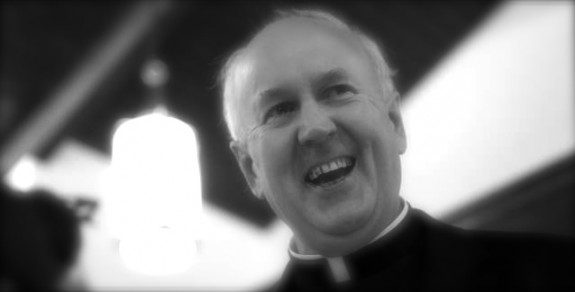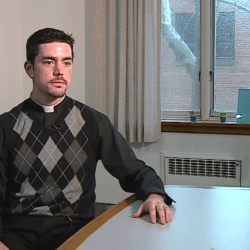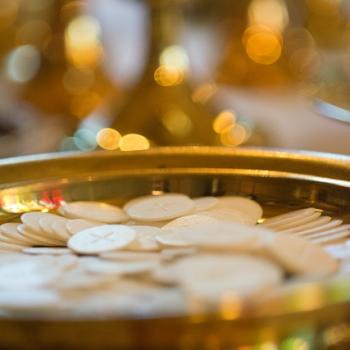The head of the new Ordinariate, bringing Anglicans into the Catholic Church, spoke recently with CNS, and had a lot of interesting things to say about his new role, and his life. The married father of three — and former Episcopal bishop — Father Jeffrey N. Steenson will be installed in his new post next month. Also next month, a class of about 40 former Episcopal priests will begin an intensive, Internet-based course of studies to become Catholic priests.
Part of the Q&A with Fr. Steenson:
Q: Some people have said it’s not really fair, because married Catholic priests can’t come back. How would you respond to that?
A: It’s kind of easy actually. That would be to compare apples and oranges. When we became priests in the Anglican Church, we became priests in an ecclesial tradition that permitted married clergy. So the Holy See is simply recognizing that and allowing us … it’s an ancient principle from the early church. Whatever stage of life you are in when you come into the ministry, that’s where you stay. So if a man came as a celibate, he would be required to maintain that discipline. If one came as a married man, he would be expected to be a good husband. And if he should ever be widowed, then he would embrace the discipline of celibacy. It’s not a new rule, it’s basically the old Eastern discipline about married clergy. So, I don’t want it to sound critical, but for those Catholic priests who left to get married and then want to come back again, that’s a whole totally different question for them. And I don’t think it is comparable to what the ordinariate is about.
Q: As the only married member of the U.S. Conference of Catholic Bishops, what do you hope to bring to the discussions at national bishops’ meetings and in the committees to which you are appointed?
A: (Laughs) I can’t even imagine. Well I was taught, in my days in the Episcopal House of Bishops, in those early days you were taught to be there, to be square and to keep your mouth shut. And I think I will have a lot to learn and I don’t anticipate doing much talking. But a lot of relationship building, I think. I’ve been to two meetings of the bishops now and it’s amazing to me that a business meeting is a business meeting, no matter what communion it’s in. So some of it is pretty tedious. I think one of the differences I see, though, is that the unity that exists among the Catholic bishops is far greater than what I see among the Episcopal bishops. I was quite taken by that, you felt that there was just a greater consensus on important things. Plus the USCCB has (Cardinal-designate Timothy M.) Dolan — I have never seen a man run a meeting so effectively as him. I’m astonished by how good he is. I’ve never seen anything like it, at any level.
Q: If you had the opportunity, what would you say to the Holy Father?
A: Thank you, first of all. This wouldn’t have happened without him. This was not an idea that developed in one of the dicasteries of the Curia. This came right from the top and he had to convince a lot of people. So I feel that Pope Benedict put himself out on the line on this, and I want to be sure we don’t let the Holy Father’s words fall to the ground. I want him to be proud of us and see that we are making a fruitful contribution to the church.
And the other thing I’d like to do if I could see him is to thank him for his Christology book that he wrote. It’s sort of a life-changer for me — “Jesus of Nazareth” 1 and 2. I’m a utility infielder at the seminary, in other words they throw me classes to teach when no one else can do it and last year I was given Christology. So the seminarians and I just read Pope Benedict, and it was an astonishing experience to do that. I think we all walked away from that experience in something of an awe for Benedict as a theologian. I’d like to thank him for that too. As a theologian I would say that in “Jesus of Nazareth” part 2, his chapter on Jesus in the Garden of Gethsemane is probably the most extraordinary piece of theology of our time. It’s astonishingly adventuresome. I mean, he opens up doors that, I don’t know, it just took my breath away. That’s probably more than your readers would be interested in, but I would vote that chapter on Gethsemane as one of the most amazing pieces of theology done in our time.
Q: Two of your sons have special needs.
A: Yes, our two boys have Asperger’s syndrome. They’re adults now. One of them lives with us; he’s employed by Walgreens, which has a phenomenal program for disabled adults. I’m amazed at Walgreens. That’s Eric. And our other son, John, lives in Seattle, on his own, and he’s a software engineer for Amazon.com. And we hold him up in prayer, more than once a day, to have our little boy out there on his own. … We moved him out in July, so about half a year now. He loves his work there. He talks about Uncle Jeff, you know, the head of Amazon. He’s been a very good employer. And then our daughter Kristina, she’s a pediatric doctor in Traverse City, Mich., with her husband and our grandson, Peter. We’re very proud of him.
None of our children has come into the Catholic Church yet. All of them are very, very interested and I think the boys will come in relatively soon. … Our children are all very strong Christians. Eric I think belongs to every young adult group in Houston, from Catholic to Baptist. He gets his social outreach through that; he’s welcomed by Christian groups.
Read it all. It’s great stuff.












